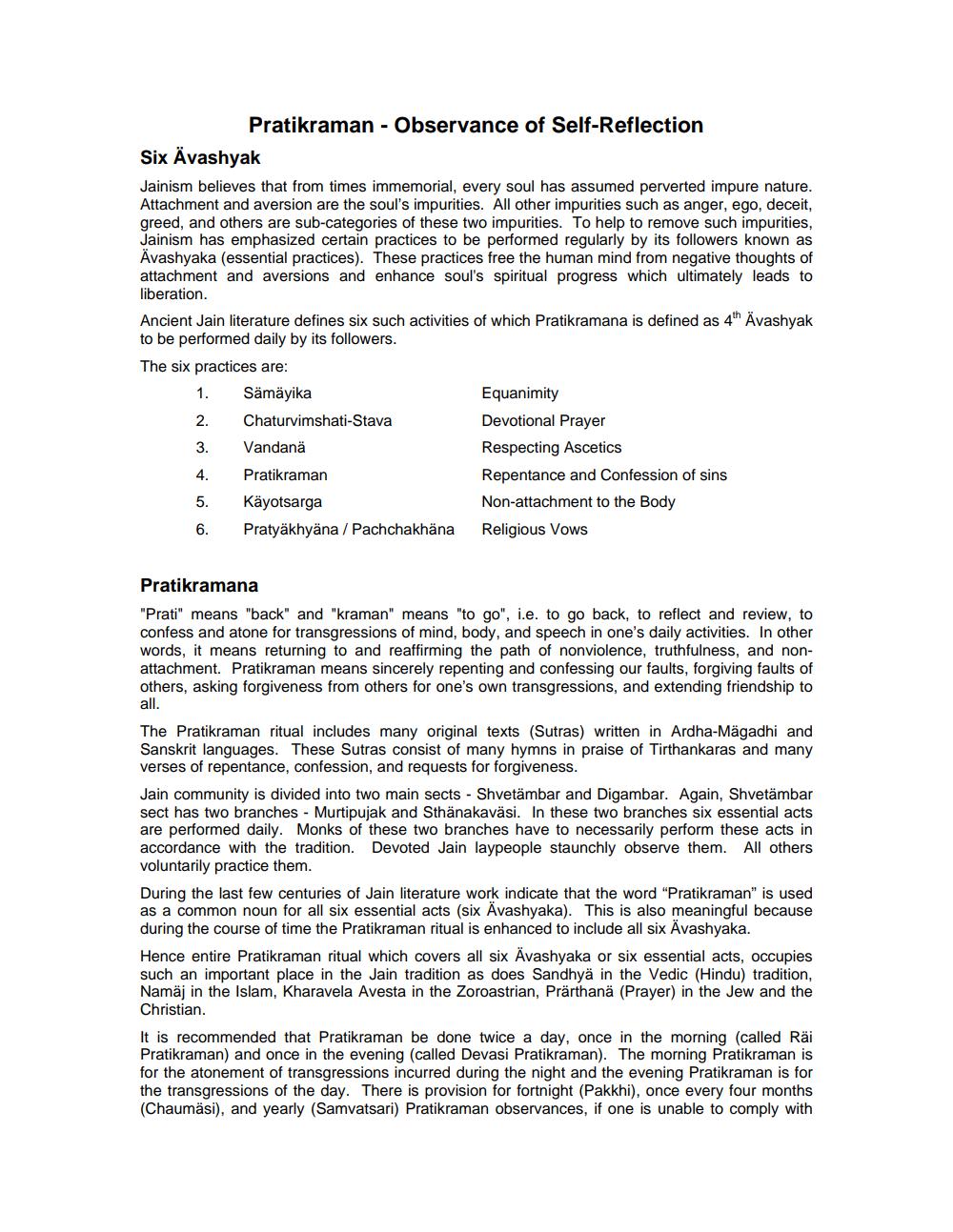Book Title: Pratikraman - Observance of Self Reflection Author(s): Pravin K Shah Publisher: JAINA Education Committee View full book textPage 1
________________ Pratikraman - Observance of Self-Reflection Six Ävashyak Jainism believes that from times immemorial, every soul has assumed perverted impure nature. Attachment and aversion are the soul's impurities. All other impurities such as anger, ego, deceit, greed, and others are sub-categories of these two impurities. To help to remove such impurities, Jainism has emphasized certain practices to be performed regularly by its followers known as Avashyaka (essential practices). These practices free the human mind from negative thoughts of attachment and aversions and enhance soul's spiritual progress which ultimately leads to liberation. Ancient Jain literature defines six such activities of which Pratikramana is defined as 4th Ävashyak to be performed daily by its followers. The six practices are: 1. Sämäyika Equanimity Chaturvimshati-Stava Devotional Prayer Vandana Respecting Ascetics Pratikraman Repentance and Confession of sins Käyotsarga Non-attachment to the Body 6. Pratyakhyana / Pachchakhana Religious Vows Pratikramana "Prati" means "back" and "kraman" means "to go", i.e. to go back, to reflect and review, to confess and atone for transgressions of mind, body, and speech in one's daily activities. In other words, it means returning to and reaffirming the path of nonviolence, truthfulness, and nonattachment. Pratikraman means sincerely repenting and confessing our faults, forgiving faults of others, asking forgiveness from others for one's own transgressions, and extending friendship to all. The Pratikraman ritual includes many original texts (Sutras) written in Ardha-Magadhi and Sanskrit languages. These Sutras consist of many hymns in praise of Tirthankaras and many verses of repentance, confession, and requests for forgiveness. Jain community is divided into two main sects - Shvetämbar and Digambar. Again, Shvetämbar sect has two branches - Murtipujak and Sthänakaväsi. In these two branches six essential acts are performed daily. Monks of these two branches have to necessarily perform these acts in accordance with the tradition. Devoted Jain laypeople staunchly observe them. All others voluntarily practice them. During the last few centuries of Jain literature work indicate that the word "Pratikraman" is used as a common noun for all six essential acts (six Avashyaka). This is also meaningful because during the course of time the Pratikraman ritual is enhanced to include all six Avashyaka. Hence entire Pratikraman ritual which covers all six Ävashyaka or six essential acts, occupies such an important place in the Jain tradition as does Sandhya in the Vedic (Hindu) tradition, Namäj in the Islam, Kharavela Avesta in the Zoroastrian, Prärthanä (Prayer) in the Jew and the Christian. It is recommended that Pratikraman be done twice a day, once in the morning (called Räi Pratikraman) and once in the evening (called Devasi Pratikraman). The morning Pratikraman is for the atonement of transgressions incurred during the night and the evening Pratikraman is for the transgressions of the day. There is provision for fortnight (Pakkhi), once every four months (Chaumäsi), and yearly (Samvatsari) Pratikraman observances, if one is unable to comply withPage Navigation
1 2 3 4
